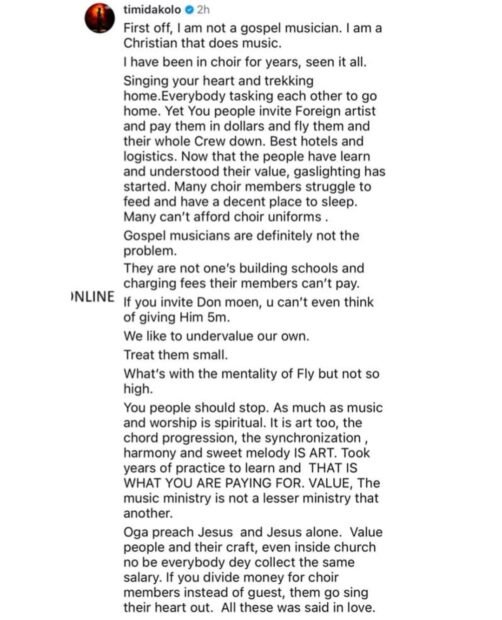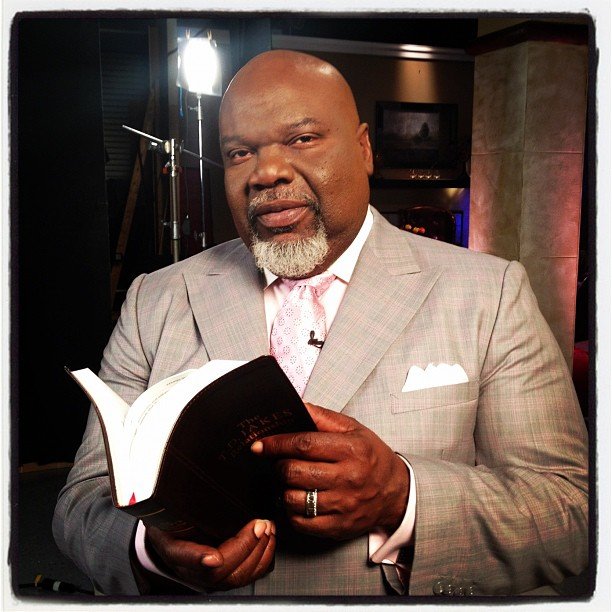Timi Dakolo Responds to Pastor Femi Lazarus: “If You Can’t Pay People, Use Your Choir Members”

Renowned Nigerian singer Timi Dakolo has publicly responded to Pastor Femi Lazarus of Light Nation Church after the pastor criticized gospel musicians who charge for ministrations. In a strongly worded statement, Dakolo defended gospel artists, highlighting the financial realities of professional music ministry and calling out the double standards often applied to gospel musicians.
Pastor Femi Lazarus recently voiced his disapproval of gospel singers who charge fees for ministering in churches, stating that ministry should not be treated as a business. His remarks sparked a wave of reactions from the gospel community, with many musicians and industry experts expressing their disagreement.
n a lengthy response, Timi Dakolo addressed what he described as a recurring issue in the church—undervaluing gospel musicians while investing heavily in other areas of ministry.
He stated:
“My dear Christians, a quote or conversation can sound intelligent and deep yet untrue. Just like everyone else, you deserve the very best things life has to offer. You should be paid what you deserve. Studio session, production, and promotion cost a lot. You have a family to feed, you have rent to pay, you have more songs to put out. We should stop all these attacks on people’s work.”
Dakolo emphasized that music, while spiritual, is also an art that requires years of dedication, practice, and financial investment. He urged churches that cannot afford to pay professional gospel artists to use their own choir members and compensate them accordingly.
“If you can’t pay people, use your choir members and pay the amount you could have given the guest artist. This gaslighting has to stop. Gospel ministers want good things too; they are not beggars.”
Timi Dakolo pointed out the hypocrisy in many churches that willingly spend large sums of money to invite foreign gospel artists but refuse to pay Nigerian gospel ministers adequately.
“You invite foreign artists and pay them in dollars, fly them and their whole crew down, book them into the best hotels, and provide full logistics. But when it comes to Nigerian gospel artists, you start undervaluing them.”
He criticized the mentality of treating gospel music as a lesser ministry while investing heavily in other aspects of church growth, such as building expensive church structures and organizing large-scale programs.
“The best architects are called upon to build big churches. Large sums of money are disbursed for promoting big programs, yet musicians are told not to charge for their work. Ministry needs music, and music needs ministry. It takes at least ten years and countless hours to become an elite musician. Develop your musicians and singers in your church and pay them well. Stop belittling them.”
Timi Dakolo further addressed the struggles of many church musicians, highlighting the financial difficulties they face despite their contributions to church services.
“Many choir members struggle to feed and have a decent place to sleep. Many can’t even afford choir uniforms. Gospel musicians are not the problem. They are not the ones building schools and charging fees that their members cannot afford.”

He concluded by urging churches to recognize the value of gospel musicians and treat them with the same respect they accord to other professionals.
“As much as music and worship are spiritual, they are also art. The chord progressions, the synchronization, the harmony, and the sweet melody; these took years of practice to learn. That is what you are paying for: value. The music ministry is not lesser than any other ministry. Value people and their craft. Even inside the church, not everyone receives the same salary. If you divide the money for the choir members instead of spending it on guests, they will sing their hearts out. All this was said in love.”
Timi Dakolo’s response has reignited a long-standing debate within the Christian community about the place of gospel musicians in ministry. While some agree that artists deserve to be compensated for their time and effort, others believe that gospel music should remain a service to God rather than a profession driven by financial expectations.

As discussions continue, many are calling for a balance, where gospel musicians are valued and fairly compensated without losing sight of the spiritual essence of their calling.
What are your thoughts? Should gospel musicians be paid for their ministrations, or should their work remain a sacrificial service to God?









